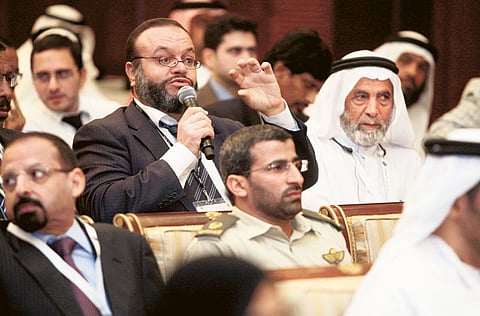Digital age calls for rethink in teaching methods
Educator urges teachers to connect with students through social media

Abu Dhabi: Traditional classroom methods, both for pupils and teachers are no longer viable, as we have now entered the age of digital literacy, a leading education expert noted at the first day of the Emirates Emirates Centre for Strategic Studies and Research's (ECCSR) second annual Education Conference's final discussion.
Held under the theme of ‘Essentials of School Education in the United Arab Emirates', the conference concluded yesterday.
"Education in the 21st century must include elements including both technological tools such as virtual classrooms and encouraging other elements within a pupil's experience, such as research, risk taking and creativity, which will allow them to build skills that they can use for the rest of their lives," Dr Robin Dada, Dean of the College of Education at Zayed University said.
Referring to the discussion's title, Skills Development for Teachers and Learners, Lolowa Al Marzouqi, an instructor at the College of Education in Zayed University highlighted that it was important to constantly seek alternative methods to foster an enjoyable learning experience.
Social media
"Nowadays, pupils and students are always interacting on social media outlets, so why don't teachers try to connect to them through those portals? It not only fosters a sense of immediate interactivity but also provides opportunities for educators to reach their students in a way that excites them," she said.
"Also, there have been concerns raised about Arab children favouring English over their mother tongue. I don't really believe that the language will ever die, it may lie dormant, but there is always a chance to resurrect it.
"One way to combat this is to have a dedicated translation activity within a classroom, that way, pupils are able to strengthen their language skills in a bilingual manner," Al Marzouqi added.
The panellists also noted that it was not just the responsibility of educators to provide a learning environment for pupils but rather, parents, siblings, friends and the wider community must all be encouraged to be active participants.
Learning process
"Parents must understand that learning does not begin or end in the class, but rather it is a process that actually begins at home, and it is there that interest and passion for learning can continue to be fostered through parents sitting down and taking an interest in the homework that is assigned, or through coming to school and being an active presence in their child's class or even by simply having a quick discussion with the teachers about how their child is doing," Dr Shaikha Obaid Al Tunaiji, Head of the Department of Foundations of Education, Faculty of Education, College Board Member, UAE University, said.
However, all the speakers agreed that it was not enough to simply discuss new teaching methods or provide study results if the workforce itself is not given the opportunity to implement them.
"It is not enough to simply discuss or introduce the elements we have discussed if there isn't a viable workforce that can implement or adapt them… that is why more effort must be done to encourage Emiratis to enter the teaching field, especially men, as they will not only connect with Emirati pupils, but also be an inside source that will build a teaching force that can reflect their culture and identity," Dr Dada said.

